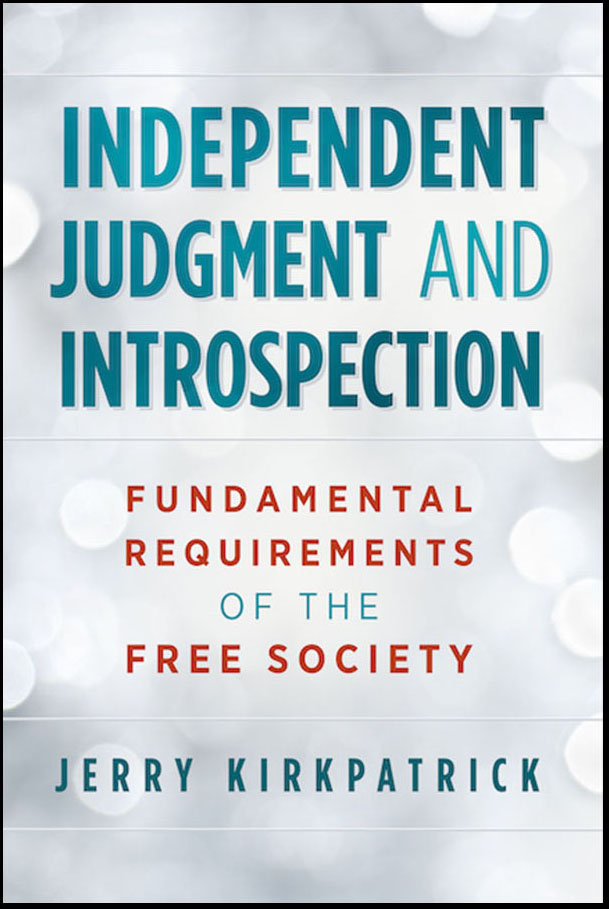Scholarly works in the Objectivist and Austrian Traditions
Reviews • Preface • Excerpt • Behind the Scenes
Independent Judgment and Introspection:
Fundamental Requirements of the Free Society
by Jerry Kirkpatrick, Ph.D., Professor emeritus of International Business and Marketing, California State Polytechnic University, Pomona (Cal Poly Pomona)
Hardcover $34.95, Softcover $16.95, Ebook $6.99
Buy: Amazon, Barnes & Noble, IndieBound
Ebook: Kindle, Apple Books, B&N Nook, Kobo, or Smashwords
Libraries: Ingram or Baker & Taylor

Excerpt, Chapter 2, pp. 67-69 (notes omitted)
Certain habits, generated from what psychologist Edith Packer calls core evaluations, plus other less fundamental but nevertheless significant evaluations, are usually acquired when young, from toddlerhood on. In particular, we subconsciously make and retain early conclusions in three influential areas: ourselves, other people, and the world in general (reality). All three, but especially the first one, produce our sense of personal identity. Core evaluations are held in our minds as unquestioned absolutes. They have become automatized habits that “operate without our permission,” as Packer puts it, to influence our development and present actions.
In toddlerhood, when we begin to speak, we are beginning to think in concepts and words, but young children do not usually form important conclusions through explicit reasoning. They often do it through a process of emotional generalization and often, though not always, through imitation of or absorption from the behavior of their parents. At the risk of oversimplification, an emotion at this stage in life, if it could be put into words, might say something like, “That made me feel good about myself. I’ll do it again.” Or, “I didn’t like that, so I’m not going to feel it next time.”
Core evaluations that can result from these generalizations, on the positive side, using Packer’s examples, might be: “Values are achievable and happiness is possible.” Or, “Life is an adventure.” On the negative side, core evaluations might be: “Life is a power struggle and, being weak, I will always be defeated.” Or, “The real me is bad.”
Repeated many times, the former emotional generalization and resulting positive core evaluations, because they are based on a correct perception of reality, can lead to the development of self-esteem and the potential for and eventual accomplishment of happiness. The latter generalization and negative core evaluations, which are mistaken, can lead to repression and subsequent psychological problems, plus the likelihood of unhappiness. And a child can form and hold both positive and negative core evaluations at the same time, which means internal conflict later in life, the development of defensive maneuvers to attempt to deal with the anxiety produced by the conflict, and a less than independent and happy psychology.
It is through this process of the early formation of mistaken core evaluations, and other thinking errors, that the development of independence and independent judgment becomes dampened and possibly prevented from developing at all. If we are taught from an early age, however, to look inward to identify our beliefs, evaluations, and emotions, especially our core evaluations, and to correct errors we have made, we would mature with healthy psychologies.



